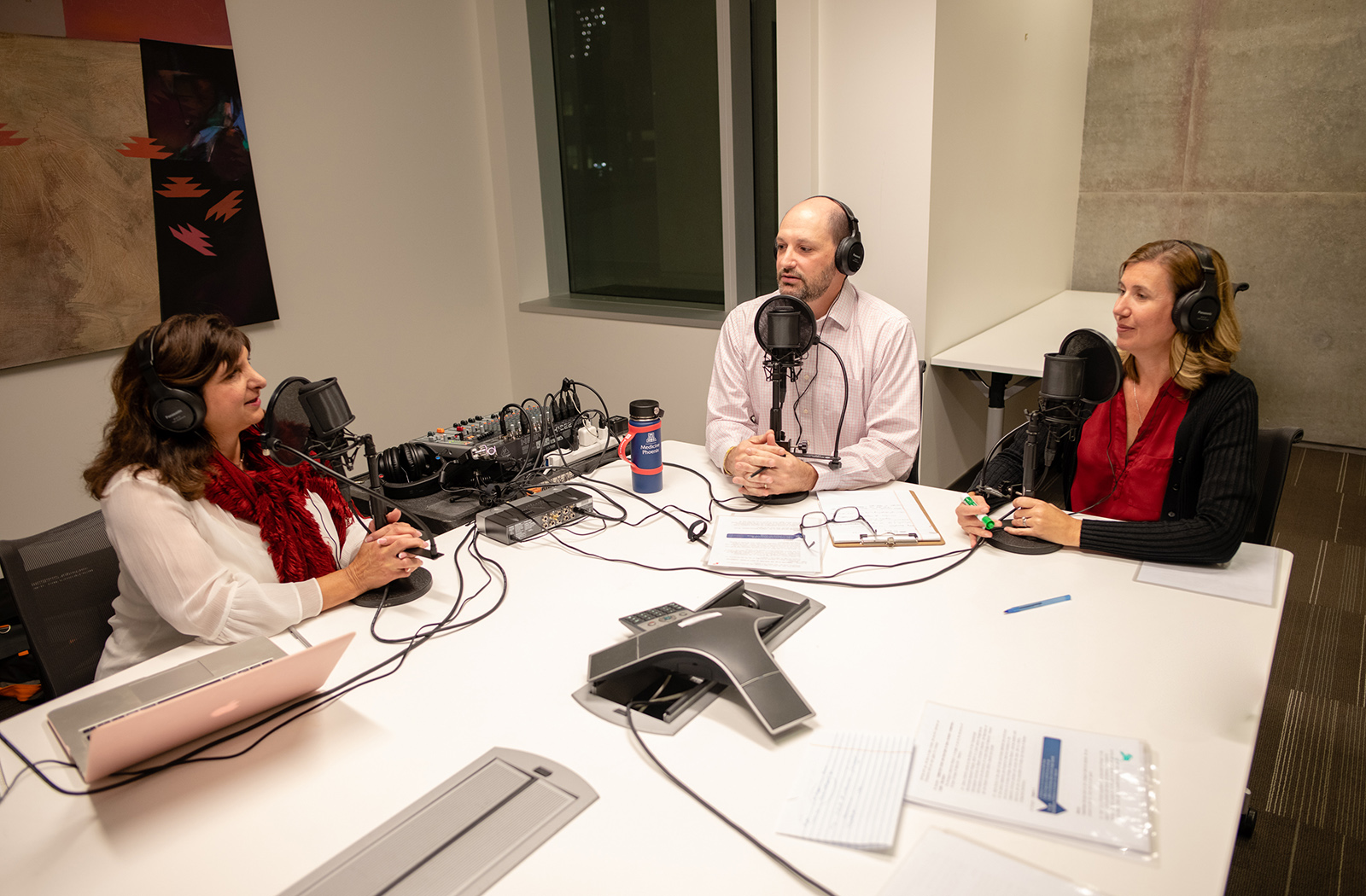
Mental Health Expert Provides Tips to Cope with the Holidays

A typical holiday season is already known to induce stress and trigger mental health conditions, such as anxiety and depression. By adding a pandemic to the mix and social isolation, experts are predicting a dark holiday season. Gina Touch, PhD, director of the Behavioral Sciences Theme and assistant professor in the Departments of Psychiatry and Family, Community and Preventive Medicine at the University of Arizona College of Medicine – Phoenix, discussed these concerns and advice for coping with the holidays.
 As a mental health professional, do you have concerns about the pandemic, holidays and mental health?
As a mental health professional, do you have concerns about the pandemic, holidays and mental health?
Holidays bring expectations about how things should be and how they will go. The pandemic is similar — in terms of how we think or worry about it, how we cope with it and how we’d like other people to behave, especially around us.
After a very long year of so many very serious public issues and conflicts, in addition to the normal personal stresses of living and the extraordinary circumstances people have faced — at this point, people are really tired. However, depending on their circumstances, they may be filled with intense emotions, or alternately, have shut them off. But something we all seem to want is relief and comfort, and something to look forward to. For many people, the holidays may be that reward — the light at the end of the tunnel.
One concern I have is that people will have expectations of the holidays — and the pandemic — that are seriously unrealistic. This may lead to difficulty managing behavior because of the fear, disappointment, guilt, anger, and all the emotions that go with the worries and (unmet) expectations. On top of the other emotions and thoughts we’ve been dealing with (or suppressing) all year, this may create an emotional “bonfire.”
I wish we all knew how to deal with all of our feelings effectively — myself included. If we could easily recognize, experience and express all of our emotions in ways that wouldn’t hurt ourselves or each other — it would be a better world. But we’d all need a lot of tutoring in emotional intelligence and ethics to learn these skills.
For people who already live with depression, anxiety and other serious mental health concerns, setting realistic expectations, thinking in ways that are helpful, managing intense emotions and coping may already be challenging.
Also, frontline essential workers who have been so responsible and committed to the public’s needs for so long are bracing themselves for what may very realistically be a surge of COVID cases and heightened risks to themselves and their loved ones during and after the holidays.
I guess I’m concerned that we are all vulnerable this holiday season, and some much more than others. I’m concerned that we will become so focused on our own vulnerability or needs that we will disregard others’ needs — especially for emotional and physical safety — during the holiday season, even as we shop online, gather, give gifts and go through the holiday motions.
I’m hopeful we will stay mindful and grateful and truly caring toward others this holiday season.
How can people cope this holiday season?
Most people are craving connection, but we have different levels of concern and "fatigue" about COVID and its impact. This may lead to the ways people will connect with those they care about during the holidays.
Some people are really trying to get back to the old normal. We often feel we deserve a reward, especially after sacrificing those things we cherish for so long. Conversely, other people are remaining very cautious and establishing a new normal, finding ways to connect (or disconnect from an overstimulating, overdemanding and unsafe world), not really missing the old normal.
For people with depression, anxiety and other mental health concerns, connecting with others in satisfying ways this holiday season may mean adding to your support system. It may mean therapy, reading good self-help books (I recommend “Reinventing Your Life” by Jeffrey Young and Janet Klosko, and “The Dance of Anger” by Harriet Lerner), and practicing self-care in every healthy way possible — exercise, yoga, meditation, good nutrition, as well as reduced use of alcohol, drugs, smoking, caffeine, etc.
For all of us, especially frontline workers, and those living with already taxed emotional and physical health issues, it means a lot of self-care, team care, humor and patience. It means examining your expectations, worries and ways of thinking, challenging the ways you typically express and cope with emotions, and trying out some new coping behavior and communication skills.
One strategy I recommend comes from Positive Psychology: to create an “upward spiral.” To do this, you have to recognize — and interrupt — a “downward spiral.” We can easily get trapped in downward spirals — whether it’s our thoughts, worries, what we ruminate about and repeat to everyone we talk to — or it’s the focus on and intensity of emotions or pain we feel without relief. Trying to reverse a downward spiral when it’s out of control is much harder than intervening at the top of the spiral, or early into the motion. You can actually catch yourself becoming negative — when you’re by yourself or with others — and try to flip the switch. Ask if what you’re thinking or saying is helpful, and if it isn’t (and it probably isn’t), try to think of something more positive (look for the silver lining) or even neutral, to lift your mood and "elevate" your thoughts.
Resources: Remember that mental health counselors are prepared to see increases in depression, anxiety or just additional needs for support during the holidays, and there are many ways of receiving therapy online, and for emergencies, via phone or text. The emergency counseling text line — 741741 — may be literally a lifesaver for those experiencing mental health emergencies.
Are there tips to make sure your mental health is in check?
There are a few brief questions you can ask yourself — and answer honestly — to admit whether you are in fact depressed, experiencing clinical levels of anxiety or other mental health concerns. Please do not keep this to yourself. Thinking that mental health issues will go away on their own is like thinking that diabetes or heat disease will just pass, but the difference is often the shame or denial that people feel on top of their depressed and anxious feelings and thoughts. Thinking can change. It takes practice, but emotions will follow!
Even getting a mental health check-up through an Employee Assistance Plan (EAP), insurance, or community mental health agencies is helpful to see if you have a diagnosable mental health issue that can benefit from therapy. To get started, take the online self-screeners called “Patient Health Questionnaire-9” (PHQ-9), the Beck Anxiety Inventory; seek resources of the National Alliance for Mental Illness (NAMI) and the local chapters of NAMI, or contact a mental health or pastoral health professional. Reach out for support, and maybe pay it forward when you are at a place to help others.
We really are all in this together — hopefully people won’t try to go through it alone.
To learn more about Dr. Touch and her tips for coping during the holidays, watch the College of Medicine – Phoenix’s Reimagine Medicine Podcast episode about “Not So Happy Holidays.”
About the College
Founded in 2007, the University of Arizona College of Medicine – Phoenix inspires and trains exemplary physicians, scientists and leaders to advance its core missions in education, research, clinical care and service to communities across Arizona. The college’s strength lies in our collaborations and partnerships with clinical affiliates, community organizations and industry sponsors. With our primary affiliate, Banner Health, we are recognized as the premier academic medical center in Phoenix. As an anchor institution of the Phoenix Bioscience Core, the college is home to signature research programs in neurosciences, cardiopulmonary diseases, immunology, informatics and metabolism. These focus areas uniquely position us to drive biomedical research and bolster economic development in the region.
As an urban institution with strong roots in rural and tribal health, the college has graduated more than 1,000 physicians and matriculates 130 students each year. Greater than 60% of matriculating students are from Arizona and many continue training at our GME sponsored residency programs, ultimately pursuing local academic and community-based opportunities. While our traditional four-year program continues to thrive, we will launch our recently approved accelerated three-year medical student curriculum with exclusive focus on primary care. This program is designed to further enhance workforce retention needs across Arizona.
The college has embarked on our strategic plan for 2025 to 2030. Learn more.